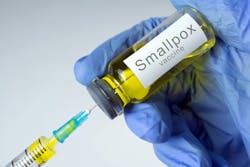Report Says Further Measures are Needed in the U.S. to Improve Smallpox Readiness and Diagnostics
A new report, according to a March 26 news release, from the National Academies of Sciences, Engineering, and Medicine says that action is needed to enhance U.S. readiness for smallpox and related diseases, as well as to improve diagnostics, vaccines, and therapeutics that could be used in case of an outbreak. The report, “Future State of Smallpox Medical Countermeasures,” details that the COVID-19 pandemic highlighted the weaknesses in the U.S. public health and healthcare systems to adapt and respond to an unfamiliar pathogen.
The news release states that “The development of better diagnostics, vaccines, and therapeutics — also called medical countermeasures — would improve the nation’s ability to respond to a smallpox outbreak or attack using the virus, the report says. It also calls for strengthening the systems and policies that would allow public health and healthcare systems to act quickly and effectively, such as those that could support rapid distribution of a vaccine.”
Further, “The report says U.S. population changes and advancements in gene editing and synthesis technologies have drastically altered the potential for a smallpox outbreak or attack in recent years. It is now possible to engineer variola virus, the virus that causes smallpox, raising the possibility of accidental or intentional release. Furthermore, illnesses related to smallpox such as mpox, Alaskapox, and cowpox are increasingly found in humans, presenting the need for medical countermeasures that can detect, treat, and prevent these diseases.”
The World Health Assembly declared smallpox eradicated in 1980. Two WHO sanctioned collections of the live variola virus store samples and use variola virus in research. Viruses related to variola, called orthopoxviruses, are also used in research.
“Research using live variola and related viruses is essential for creating and improving medical countermeasures for smallpox and other related diseases, and to ensuring the U.S. is ready to respond to an outbreak, says the report,” the news release adds. “Live variola in particular is essential for developing new targets for more effective therapeutics; verifying the efficacy of vaccines, treatments, and diagnostics for smallpox; and creating animal models that can be used in research in place of humans. Research using these viruses can also fill gaps in our fundamental understanding of orthopoxvirus biology, ecology, evolution, transmission, and disease onset in humans.”
The report says that decision-makers should consider the benefits and risks for smallpox medical countermeasures and note impacts will be increased and accelerated by advances in artificial intelligence.
As for diagnostics and vaccines, the report says that diagnostic tests that can more accurately detect smallpox and related viruses, identify cases at earlier stages of the disease, and assess prior exposure of immunity to smallpox are needed.
Developing new smallpox vaccines that use a multi-vaccine platform, which use common vaccine vectors, manufacturing ingredients, and processes, would improve the capacity for faster production and reduce the need for stockpiling.
Larry Gostin, distinguished university professor and director of the WHO Organizing Collaborating Center on National and Global Health Law at Georgetown University was quoted in the news release saying that “The gaps in our ability to respond to a new infectious disease were revealed by the COVID-19 pandemic and recent mpox outbreak It is vital to prioritize research into the development of safer and more effective smallpox diagnostics, vaccines, and therapeutics, make judicious choices in stockpiling, and have modern, well-practiced, and adaptable plans for responding in the event of a smallpox outbreak.”
Additionally, the report explains that plans for responding to a smallpox outbreak or attack need to be flexible and continuously updated to meet the challenges of potential circumstances. The limited number of manufacturers that are able to produce smallpox medical countermeasures is concerning, as is the insufficient capacity to scale production in the event of an outbreak.
The news release says, “In the case of an international smallpox emergency, U.S. readiness and response capabilities will be significantly affected by the ability of other countries to detect and contain smallpox transmission. Supporting international capacity and ability to access smallpox medical countermeasures will improve U.S. biosecurity in turn.”
The study is published by the Committee on the Current State of Research, Development, and Stockpiling of Smallpox Medical Countermeasures, and is sponsored by the Administration for Strategic Preparedness and Response.
